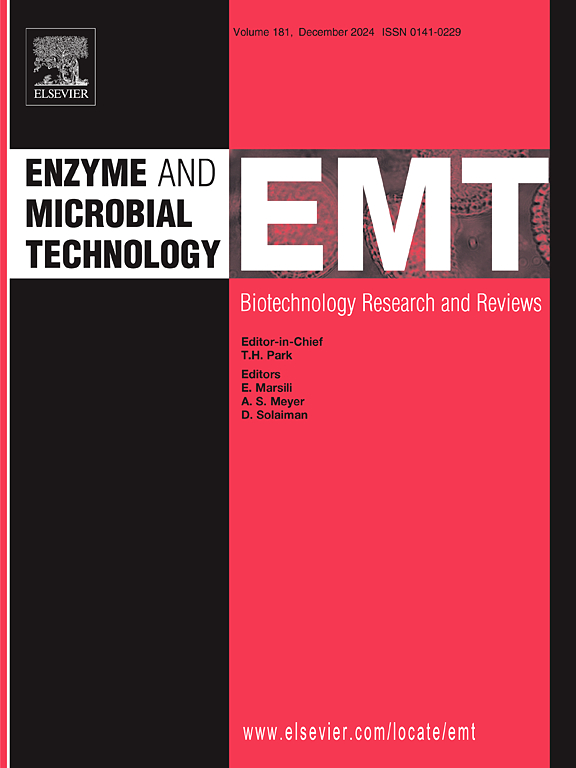大肠杆菌全细胞生物催化剂从3-甲基吡啶生产烟酸
IF 3.7
3区 生物学
Q2 BIOTECHNOLOGY & APPLIED MICROBIOLOGY
引用次数: 0
摘要
烟酸是烟酸(维生素B3)的一种生物活性形式,是参与多种代谢途径的必需营养素。它的缺乏可导致严重的健康问题,强调需要有效的生产方法。传统的合成烟酸的化学方法往往需要苛刻的反应条件,并产生对环境有害的副产物。这促使人们对更可持续的生物催化剂替代品越来越感兴趣。在这项研究中,我们研究了利用表达恶臭假单胞菌mt-2酶的重组大肠杆菌静息细胞将3-甲基吡啶(3-MP)转化为烟酸。通过系统优化,MG1655罕见的大肠杆菌细胞co-overexpressing二甲苯单氧酶(XMO: XylM及其还原酶XylA)和苄醇脱氢酶(XylB)实现高效的生物转化9 8.28 mM它 ±0.35 mM烟酸 12小时内,对应的收益率92.0 % ±3.9 %。本研究为烟酸合成提供了一种流线型的生物催化途径,为微生物生产系统的进一步代谢工程奠定了基础。本文章由计算机程序翻译,如有差异,请以英文原文为准。
Nicotinic acid production from 3-methylpyridine by E. coli whole-cell biocatalyst
Nicotinic acid, a bioactive form of niacin (vitamin B3), is an essential nutrient involved in various metabolic pathways. Its deficiency can lead to severe health issues, emphasizing the need for effective production methods. Traditional chemical methods for synthesizing nicotinic acid often require harsh reaction conditions and produce environmentally hazardous byproducts. This has prompted increasing interest in more sustainable biocatalytic alternatives. In this study, we investigated the bioconversion of 3-methylpyridine (3-MP) to nicotinic acid using resting cells of recombinant Escherichia coli expressing enzymes from Pseudomonas putida mt-2. Through systematic optimization, E. coli MG1655 RARE cells co-overexpressing xylene monooxygenase (XMO: XylM and its reductase XylA) and benzyl alcohol dehydrogenase (XylB) achieved efficient biotransformation of 9 mM 3-MP to 8.28 ± 0.35 mM nicotinic acid within 12 hours, corresponding to a yield of 92.0 % ± 3.9 %. This work presents a streamlined biocatalytic route for nicotinic acid synthesis and offers a foundation for further metabolic engineering of microbial production systems.
求助全文
通过发布文献求助,成功后即可免费获取论文全文。
去求助
来源期刊

Enzyme and Microbial Technology
生物-生物工程与应用微生物
CiteScore
7.60
自引率
5.90%
发文量
142
审稿时长
38 days
期刊介绍:
Enzyme and Microbial Technology is an international, peer-reviewed journal publishing original research and reviews, of biotechnological significance and novelty, on basic and applied aspects of the science and technology of processes involving the use of enzymes, micro-organisms, animal cells and plant cells.
We especially encourage submissions on:
Biocatalysis and the use of Directed Evolution in Synthetic Biology and Biotechnology
Biotechnological Production of New Bioactive Molecules, Biomaterials, Biopharmaceuticals, and Biofuels
New Imaging Techniques and Biosensors, especially as applicable to Healthcare and Systems Biology
New Biotechnological Approaches in Genomics, Proteomics and Metabolomics
Metabolic Engineering, Biomolecular Engineering and Nanobiotechnology
Manuscripts which report isolation, purification, immobilization or utilization of organisms or enzymes which are already well-described in the literature are not suitable for publication in EMT, unless their primary purpose is to report significant new findings or approaches which are of broad biotechnological importance. Similarly, manuscripts which report optimization studies on well-established processes are inappropriate. EMT does not accept papers dealing with mathematical modeling unless they report significant, new experimental data.
 求助内容:
求助内容: 应助结果提醒方式:
应助结果提醒方式:


